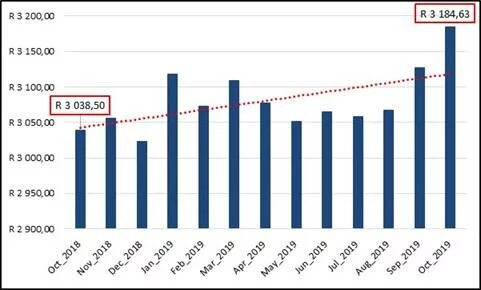
October 2019 Household Affordability Index
Food prices continue to rise. The trajectory is an upward trend. October 2019 sees a third consecutive month of increases in the cost of the household food basket which may continue to rise into the new year.
See Figure 1 below.
- Month-on-month the cost of the household food basket increased by R57,42 (1,8%) to R3 184,63 in October 2019.
- Year-on-year the cost of the household food basket increased by R146,14 (4,8%) from R3 038,50 in October 2018 to R3 184,63 in October 2019.
This month sees price spikes in vegetables caused by high temperatures, low rainfalls and late frosts in KwaZulu-Natal.
- a 10kg pocket of potatoes increased by 34% with a pocket averaging R73.
- a 10kg pocket of butternut increased by 50% with a pocket averaging R78.
- carrots and spinach increased by 12%; cabbage increased by 10%, and onions by 9% between September and October.
Other increases include: cake flour (up 7%); white sugar, sugar beans and Samp (all up 2%); and important for children’s lunchboxes: apples (up 18%), bananas (up 7%); and peanut butter (up 15%) and jam (up 4%). The drivers of this upward trajectory in the basket can be seen on page 2 of the Household Affordability Index (attached).
On the 1st of October 2019 government increased the value of the Child Support Grant (as per the February Budget) by R10. The Child Support Grant is now valued at R430 a month.
- In October 2019 the Child Support Grant is still set 23% below the food poverty line (of R561) and 25% below PMBEJD’s data on the cost to secure a basic nutritious diet for a small child aged between 10 – 13 years (R576,67).
- This deficit widens as children grow older and need to eat more food.
In October 2019 a general worker earning the National Minimum Wage at the 10% exemption level and working for a full 23 days earned R3 312 per month. Transport cost R1 288 (38,9% of the wage) and electricity cost R598,52 (18,1% of the wage). Together transport and electricity charges take up 57% (R1 886,52) of the National Minimum Wage, leaving R1 425,48 for all other expenses (including food).
- The cost of a basic nutritional basket of food for a family of four was R2 353,55 in October 2019 and for a family of seven (the average household size for households living on low incomes in Pietermaritzburg) was R4 115, 76. South Africa’s working class are not able to feed their families properly on the wages earned.
- In October 2019 our data shows that families are underspending on proper nutritious food by 23% (at the very best-case scenario).
Affordability is related to the number of persons employed, income levels and the cost of goods and services (of which transport, electricity and food costs take up the bulk of the wage). Affordability is directly related to our health, well-being and productivity.
This month electricity load shedding and black outs will incur a greater cost for households (financial and health). Households living on low incomes absorb electricity blackout shocks not by spending more money but by cutting back on other essential expenses like nutritious food to pay for non-electrical energy which must be secured to cook basic staple food (all South Africa’s staple food requires cooking). Because this month sees a significant rise in food prices, households face a situation of less monies in their pockets concurrently with higher costs of goods and services.
For more information or media enquiries please contact Mervyn Abrahams on 079 398 9384 or at mervyn@pmbejd.org.za
